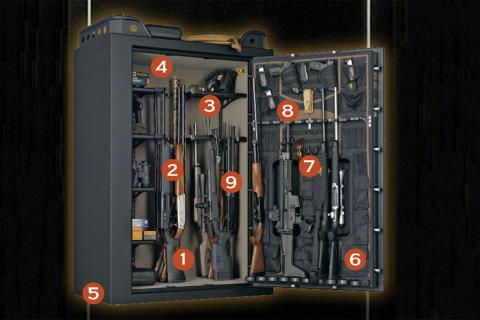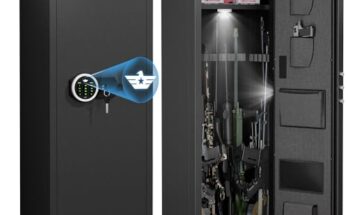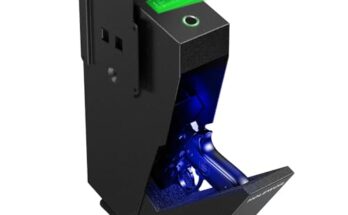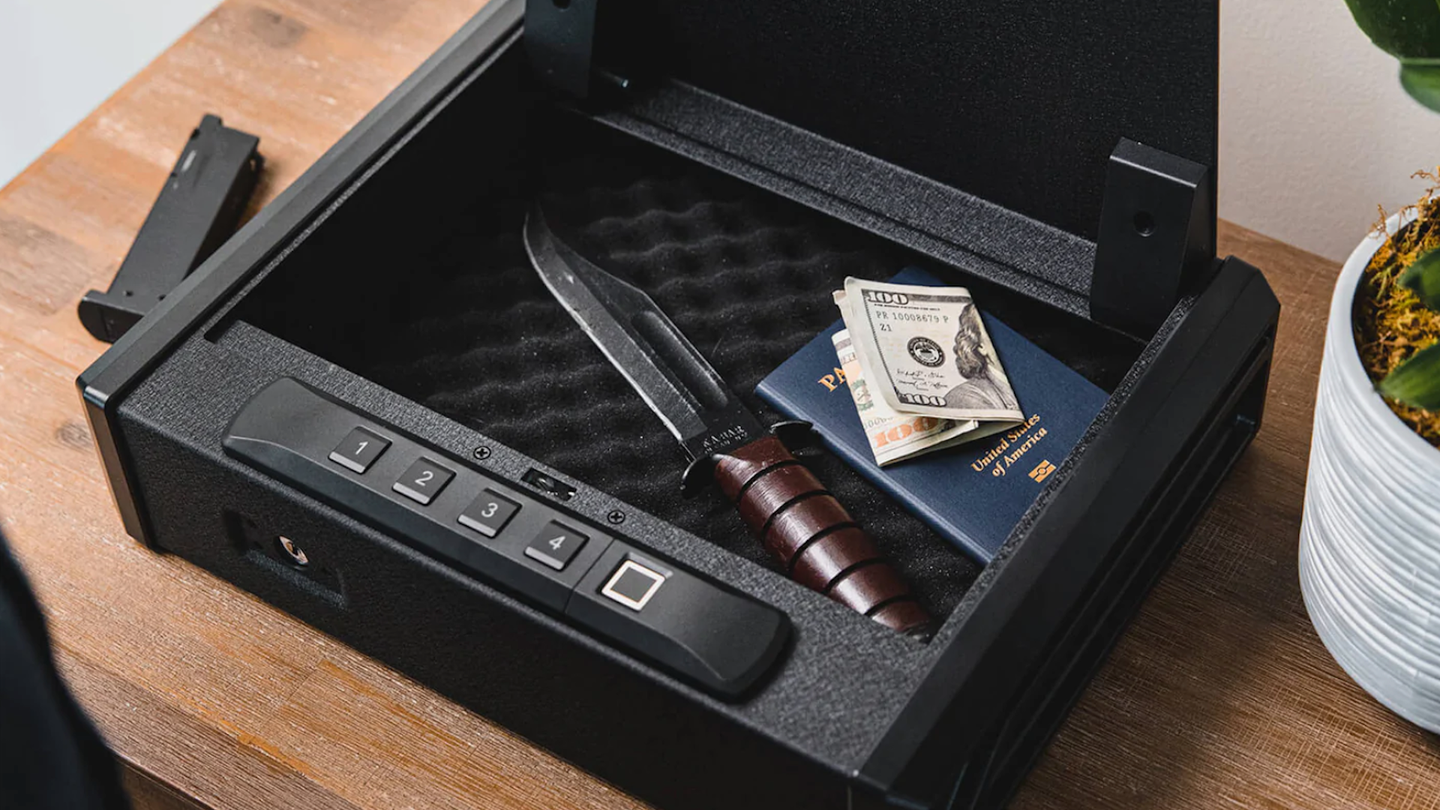Yes, a gun safe can be too dry, leading to potential damage to firearms. Very low humidity can cause wood stocks to crack and metal to deteriorate.
Ensuring the longevity and proper maintenance of firearms involves more than just securing them in a gun safe; it is crucial to maintain an optimal environment inside the safe as well. Excessive dryness, although less discussed, can pose a significant threat to the condition of your guns.
A very dry gun safe can lead to wood components drying out and cracking, while metal parts may be at a higher risk of rust in the absence of a minimal level of humidity. Gun owners should strive for a balanced humidity level to protect their firearms from the adverse effects of both moisture and excessive dryness. The goal is to create a stable atmosphere within the safe that preserves the longevity and functionality of the guns, ensuring they remain in prime condition for use or collection purposes.

Credit: 1source.basspro.com
The Risks Of Over-drying Gun Safes
Protecting firearms means controlling humidity levels. Too much moisture risks rust, but over-drying a gun safe can cause problems too. Finding the right balance is key.
Impact On Firearm Lubrication
Firearms need lubrication. Excessive dryness strips away necessary oils. This can lead to increased friction and damage when firing. Let’s keep our guns smoothly operational.
| Humidity Level | Effect on Lubrication |
|---|---|
| High | Oils preserved, but rust risk. |
| Low | Lubrication diminished, functionality suffers. |
Wooden Stock Damage
Wooden gun stocks are sensitive to humidity changes. Extreme dryness can cause stocks to warp or crack. This affects both aesthetics and performance. Let’s avoid damaging these beautiful and functional pieces.
- Warping: Misshapen wood altering aim.
- Cracking: Severe damage leading to stock replacement.
Ideal Humidity Levels For Gun Storage
Keeping guns safe is important. Not too moist, not too dry is key. But can a gun safe be too dry? Yes, it can. Metals need some moisture. Too dry air may harm wooden parts and cause damage over time.
Recommended Humidity Range
The best humidity level for gun safes is between 30%-50%.
- Below 30% – Air might be too dry, risking metal corrosion and wood cracking.
- Above 50% – Moisture can cause rust and mildew, damaging guns.
Tools For Monitoring Humidity
Reliable tools help maintain the ideal humidity in your gun safe.
| Tool | Use |
|---|---|
| Hygrometer | Measures humidity levels accurately. |
| Dehumidifier | Controls moisture, maintains stable conditions. |
| Moisture Absorbers | Chemically absorbs excess moisture. |
Regular checks using these tools ensure your guns stay in top shape.
Effects Of Humidity On Ammunition
Keeping a gun safe at the ideal humidity level is crucial for preserving ammunition. Too much moisture can lead to rust and damage, while excessively dry conditions may also have negative effects.
Corrosion Of Cartridges
Excessive moisture is a major enemy of ammunition. Corrosion on cartridge casings compromises the integrity and performance of ammunition.
- Rust forms on the brass or steel, leading to possible malfunctions.
- Primer and powder deterioration can occur, causing misfires or reduced power.
Ammunition Shelf Life
The lifespan of bullets greatly depends on storage conditions. Dry environments help prolong shelf life.
| Condition | Effect on Ammunition |
|---|---|
| High Humidity | Decreases shelf life through rust and degradation. |
| Optimal Dryness | Preserves ammunition quality over time. |

Credit: www.amazon.com
Balancing Dryness And Moisture
Protecting your firearms from corrosion and damage means finding the right environment for storage. Too much moisture leads to rust, while excessive dryness can harm gun stocks and other components. Let’s explore how to keep your gun safe at the perfect humidity level.
Using Desiccants
Desiccants absorb moisture, keeping your gun safe dry. These small packets often contain silica gel, which traps water from the air.
- Place them around your safe for even coverage.
- Change or recharge them as needed, following the instructions.
Monitor desiccants closely. Too much absorption might make the safe too dry.
Alternative Humidity Control Solutions
There are devices and methods to help balance the humidity inside a gun safe. Here are a few:
| Method | How It Works | Consideration |
|---|---|---|
| Electric Dehumidifiers | Draw moisture from the air | Need power source |
| Humidity Control Rods | Maintain a stable temperature | Prevent condensation |
| Hygrometers | Measure safe’s humidity | Helps adjust methods |
Choose an option that fits your safe’s size and your environment. Keep an eye on humidity levels with regular checks.
Maintaining Your Safe And Firearms
Protecting your firearms goes beyond securing them from unauthorized access. A gun safe’s environment plays a crucial role in preserving the quality and functionality of its contents. One key aspect often overlooked is the humidity level inside the safe; too much moisture can lead to corrosion, while an extremely dry environment can have its own negative effects. Understanding how to maintain the ideal conditions within your safe ensures your firearms remain in pristine condition.
Regular Safe Inspection
Regular checks on your gun safe can prevent many issues. It’s vital to monitor not only its structural integrity but also the internal conditions.
- Check the humidity levels with a hygrometer.
- Inspect for signs of rust or corrosion.
- Ensure the seals are intact and the door closes properly.
- Look at the condition of desiccants or dehumidifiers.
Firearm Maintenance Tips
Maintaining firearms extends their lifespan and reliability. Here’s a checklist to help keep your guns in top condition:
- Clean guns regularly to remove residues and prevent buildup.
- Lubricate moving parts to reduce wear and protect against rust.
- Store firearms unloaded and ensure safety devices are engaged.
- Use silicone-treated gun socks for added protection against scratches and moisture.
Credit: www.libertysafe.com
Frequently Asked Questions For Can A Gun Safe Be Too Dry
What Is The Correct Humidity For A Gun Safe?
The ideal humidity level for a gun safe is typically between 30-50%. Keeping it within this range helps prevent rust and corrosion on firearms.
Do All Safes Have Moisture Problems?
Not all safes experience moisture issues, but factors like climate and location can increase the risk of humidity-related problems.
Are Gun Safes Moisture Proof?
Many gun safes offer some level of moisture protection, but not all are completely moisture-proof. It’s important to check the manufacturer’s specifications for details on moisture resistance. Consider adding desiccants or a dehumidifier for enhanced protection against moisture.
Do I Need A Dehumidifier For My Gun Safe?
Yes, using a dehumidifier in your gun safe helps prevent rust and corrosion on firearms by controlling moisture levels.
Conclusion
Maintaining the right humidity in your gun safe is a delicate balance. An overly dry environment might protect against rust, but could damage wood and cause brittleness. Regularly monitor humidity levels and use desiccants sensibly. Proper care ensures your firearms stay in top condition, safeguarded from extreme dryness.



